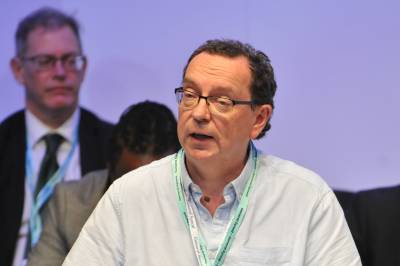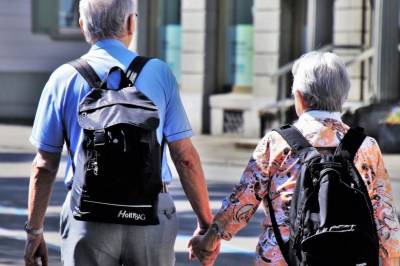13/12/2023
Reporting abuse and finding support
If you need access to support, please contact the Safe Spaces helpline by calling 0300 303 1056 or by visiting this Church of England webpage, where external support services are listed, including listening, advice, and counselling services.
By Bishop Joanne Grenfell, Church of England’s Lead Bishop for Safeguarding
First, I want to apologise to those who have experienced or experience abuse in the Church and say sorry for the pain and trauma caused by any actions or omissions by the Church.
Developing the Redress Scheme is also a tangible way of saying sorry. In November, General Synod approved the first consideration of the draft Redress Measure which makes legal provision for the creation of a national redress scheme for victims and survivors of Church-related abuse. The measure was overwhelmingly supported by Synod and as a member who spoke in the debate said, it was a timely reminder of the importance of never forgetting the hurt caused to survivors by the Church. Yes, some of the details raised are yet to be ironed out, but it felt like a big step.
What I’ve learned so far
One of the learning points for me since taking on this safeguarding role earlier this year, has been joining the National Safeguarding Team’s online engagement forums where victims and survivors shape the agenda through questions and discussion. Each session has felt like a fruitful and engaging time, and I’ve already learned a lot from the listening that’s at the heart of the meetings.
I won’t ever comment on what survivors have said in those meetings. We agree to confidentiality, and I stick to that strictly. But I hope I might tell you something of what I’ve learned so far – to give you a flavour of the kind of points that have stuck with me and made me think about how I might act differently or try to influence change in safeguarding more widely across the Church of England. As we think particularly about redress I want to reflect on restorative practice and action that isn’t only about money but is also about acknowledgement, understanding, empathy and change.
Two questions have shaped my thinking:
- What are we hearing?
- And, what are we saying?
I am hearing about the importance of:
Support and advocacy
Navigating a way through the Church of England’s complaints or clergy discipline process is a lonely and frustrating business. People who want to raise an issue often find that the burden of collecting evidence, trying to convince the right people, filling in official forms, and understanding the processes that follow, is soul destroying. The safeguarding team or archdeacon can alleviate some of that without taking away the autonomy of the complainant to decide when and how to raise the issue and to do so in their own words. Exploring the possibility of an archdeacon bringing a complaint in their position as a person with a “proper interest” in the misconduct is one option. Another is for the church to signpost to, and pay for, an independent professional advocate. A supportive PA, or similar, can also help with the paperwork aspects. But most of all, better training and resourcing for archdeacons and diocesan safeguarding team members, which I would have welcomed as a former archdeacon, to know what support they can offer would make a vast difference. We need to hear what is going wrong in our failure to support people well, in order to do better for the future.
Language
The way that decisions are communicated can make them so much harder to hear. Sometimes there may not be enough evidence for a complaint to be upheld, but the way that this is explained to a complainant can add unnecessary hurt to someone who is already hurting. Legal matters do need to be set out clearly, for the avoidance of doubt, but there is no reason why such communications cannot also be attentive to the feelings of the complainant and acknowledge the emotional cost to them of having brought a complaint. Casting doubt on their reliability or making insinuations about their motives or capabilities is deeply insulting. The complaints process must not retraumatize those who have suffered or suffer abuse in the Church.

"Further listening and learning need to follow if we are to really understand how redress is about more than money"
Trust
I recognize that it is hard for victims and survivors to even trust church officials, bishops, NST staff enough to be willing to engage with us at all. When abuse has been perpetrated and then compounded with an inadequate response – either unintentionally or, sometimes, wilfully – then there is little possibility left of victims and survivors trusting those of us who represent the institution. That’s why I am grateful to all those who engage, not just in the survivor open forum meetings, but in the various areas of the NST’s work – across redress, policy development, practice improvement, theology, training, and a whole host of other areas – to help us to hear the insights that we need to hear and act on the changes that they are telling us and we need to make. I am willing to hear the hard things that victims and survivors are saying to us about safeguarding practice now.
What is the Church saying about making amends?
And, in response, what are we saying about making amends?
Making restitution has deep biblical roots. I am thinking especially of Zacchaeus in Luke 19 and of the virtue of giving half our possessions to the poor, and, if we have cheated anybody out of anything, paying back four times the amount. Salvation is not something that he buys, but Zacchaeus’s action connects him, as a son of Abraham, with Jesus.
Our actions now, as churches, parishes, dioceses, cathedrals, Church Commissioners, can speak of God’s justice. They should speak in tangible and trauma-informed ways of support for victims and survivors. They must also speak of our commitment to culture change across the whole body of the church.
Listening and learning need to be at the heart of redress and all safeguarding work. I think that General Synod was listening carefully when it gave early consideration and overwhelming support to the Redress legislation, legislation which will pave the way for the Church of England to do better at saying sorry. Further listening and learning need to follow if we are to really understand how redress is about more than money, and to discern how to develop a culture where we properly take responsibility for preventing, addressing, and repenting of the harm that can be done in our church communities.
I wrote this prayer for Safeguarding Sunday for The Clewer Initiative but I hope it could be used throughout the year – please also see the video below:
Lord of all truth and light,
you know the pain of those who are abused,
in families, churches, and communities, and by human trafficking.
Shine the beams of your light into the shadowy corners of human behaviour,
that we may see the harm that hides among us
and, so seeing it, prevent it,
bringing an end to the exploitation and transport of human beings
for the profit or gratification of others.
We ask this through Jesus Christ, our guardian and our protector. Amen.


